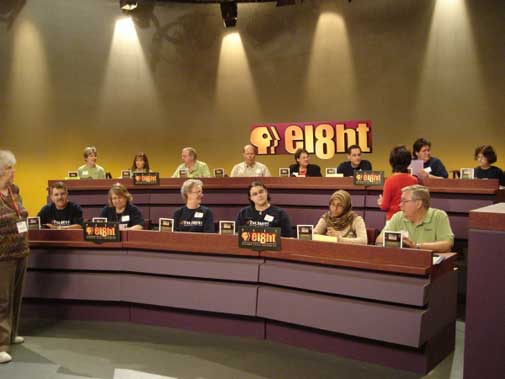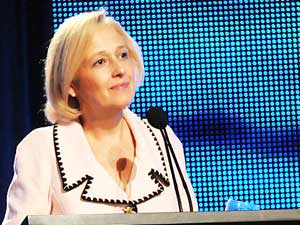
By Tom Brinkmoeller
PBS's lead affiliate station in Los Angeles, KCET, is dropping its network membership because of the amount of dues it was being asked to pay. Several public TV stations have decided to furlough employees to prop up weak budgets. One public-TV station in Texas and another in Michigan, each formerly owned by educational institutions, have been jettisoned, reportedly for reasons that include money. For public television near the end of 2010, that's only the top of the problems list...
The Corporation for Public Broadcasting (CPB) is encouraging underfunded stations in neighboring markets to merge as a way to stay alive. A study done recently for CPB reports non-governmental financial support for public television fell by $262 million over recent years, a number estimated to almost double by 2013. PBS wants to begin raising money on the Internet, but some turf-sensitive affiliate stations are fighting the idea, arguing the money they traditionally raise locally will be siphoned away to Washington.
The diagnosis for PBS?
"It's on the critical list, but it will recover," said Steve Behrens, editor of Current, a national newspaper that covers public radio and television. "But will it ever be the same?"

No, it won't, and that isn't all bad, said PBS President and CEO Paula Kerger in a phone interview this week with TV WORTH WATCHING.
She acknowledged the economic issues while pointing out that her network has built new ways to deliver content to its fans, attract new audiences, raise funds and cut costs without necessarily cutting quality.
The PBS Web presence has grown significantly, she pointed out, through its own site and by delivery of programs over third-party sites such as YouTube and Hulu, and apps for smart phones and devices like the iPad.
She mentioned, as other signs of vitality, the network's increased amounts of children's programming, and the use of the Internet as "an incubator" in which new programs can be tested and grown before they join the broadcast schedule.
Kerger also envisions many more sharing partnerships among nonprofit stations, similar to those going on now between public radio and TV news operations, as a way of keeping standards high while spending less.
"I think the story for public broadcasting is one of that, despite that we're working through some hard times, we've been able to break through a good bit," she said.
"I just have this sense that we're sort of re-imagining the medium as we're living it right now."
While it reinvents its methods, PBS still has more than a few fires to fight. The defection of KCET, currently, is the largest blaze, with several analysts wondering if the move will permanently hurt PBS in the nation's second-largest television market and whether the move will motivate other cash-strapped stations to walk away, too.
Kerger said PBS hopes to replace the station's impact by utilizing the three other public TV stations in the Los Angeles area. She wouldn't say whether the replacements now reach as many homes as KCET, but it's her goal to make sure "to get PBS programming to the entire market" by the end of this year.

The furloughing of employees at public stations is a sign of the current economic picture, but she said public stations are faring better than and not doing as many short-term layoffs as many other nonprofits, such as museums. For two years, it has been a major goal of PBS to help stations in jeopardy, many of which have had their state support reduced or eliminated by state governments.
Current's Behrens said some of the ideas being offered by PBS CPB worry local-station administrators and boards of directors. He said they fear mergers would take away local autonomy and identity, and central fundraising would divert their money to a central treasury.
"In general, they're suspicious of Washington."
"What (CPB is) trying to encourage is, where it makes sense, there would be collaboration," Kerger said. By combining some business functions, she said, stations could reduce "back office" expenses "so that more resources may be put on the air." The Internet fundraising she sees being done by PBS would complement what is done locally. Many Web users end up on the PBS site without connecting to the site of the local station. She wants to make sure that visitors to the national site have a way to donate, with the raised money going to the visitor's local station.
She said testing of the central-giving concept would be done soon and the results would be presented to local managers later this year, along with the rationale for merging stations, in hopes of calming their worries and gaining their support.
Though Kerger said "I'm not sure I fully agree with" the study that showed huge reductions in the amount of private money that will be given to public television, "I think it is clear we have to think very carefully about how we bring new funding into public broadcasting."
Corporate support of established PBS series has increased 10 percent this fiscal year over the previous one, she said, and many foundations continue to give support to specific types of programs. Still, individual support remains essential to the future of public broadcasting. In addition to traditional programming, Kerger believes that new ways of reaching the public will maintain public support:
"We have to find new ways to connect with the people who are using our services. That's how we're going to turn this around. There is opportunity, but there is not one silver bullet."